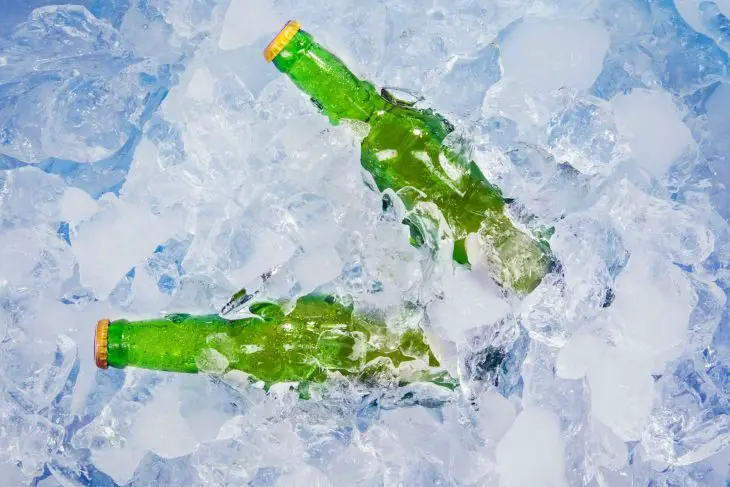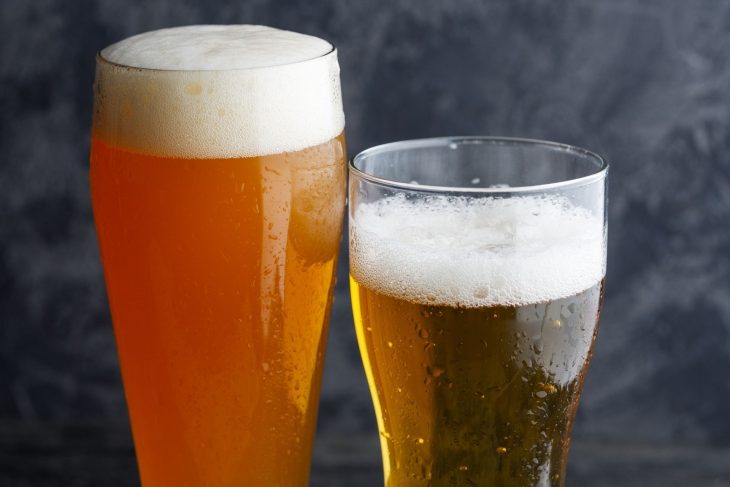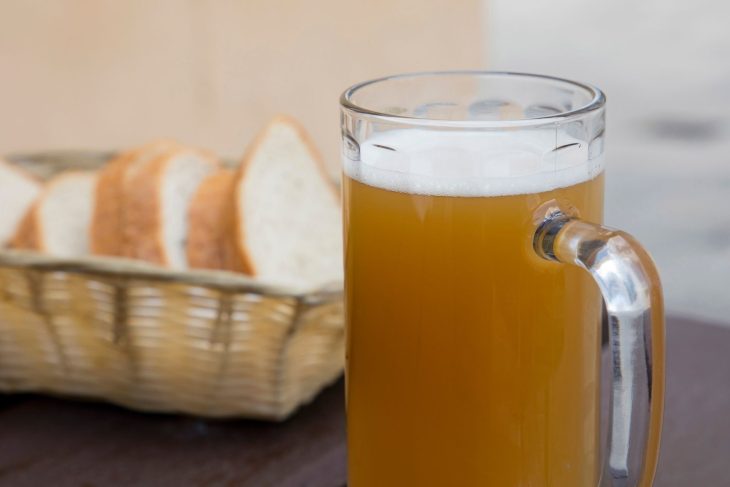Hey there! This site is reader-supported and we earn commissions if you purchase products from retailers after clicking on a link from our site.
Few things get brew heads as excited as a discussion between hazy beers and clear ones. Whether you saw a murky pint being brought over a table last night at the bar or you have been pondering between filtered vs unfiltered beer for a while, there are a few things you have to know. That murky beer could actually be your next favorite if you opt to give it a try.
If you’ve been wondering what unfiltered beer is and what kinds of beer are often unfiltered, you’ve come to the right place.
What is Filtered Beer?
A filtered beer refers to any fermented malt beverage, ale, or lager that has had the remaining sediment from fermentation removed prior to bottling. Most mass produced beer—think Budweiser and Coors—are mechanically filtered. There are two techniques that can be applied: cake filtration and surface filtration. The style of beer often determines if the liquid is going to be passed through a powdered, cakey substance or finings. Some filters are rougher than others, which leads to the beer taking on various characteristics.
For instance, a rough filtered beer might retain some cloudiness, but it will still have far more clarity than unfiltered beer. Any beer that has been filtered, regardless of how the filtration was done, is rendered stable. This means that all conditioning has stopped.
Another option is cold filtering, where the lower temperatures cause the proteins and other organic matter in beer to clump together, making the sediment easier to remove.

What Does Unfiltered Beer Mean?
According to the Danish beer brewery Carlsberg, unfiltered beer “does not undergo extra filtration before it is bottled, so it is usually less clear than filtered beer.” So the misconception that unfiltered beers are either unfinished or dirty is untrue. Filtered beers can be refreshing, but they tend to miss out on the more complex qualities, like aromas and flavors, of an unfiltered brew.
For many years, breweries were devoted to churning out crystal clear beers, because that was thought to be a sign of quality, or that the brewery wasn’t sloppy. These days, more and more breweries are foregoing filtration in an attempt to give their beers as much character as they can.
There are different kinds of unfiltered beers these days, including Hazy IPAs or New England IPAs (the direct opposite of the ultra-filtered West Coast IPA), Florida-style IPA (FLIPAs), milkshake IPAs, glitter beers, gose, Zwickel lagers, and Kellerbier.
New England IPA/Hazy IPA
These are beers that are made to be purposely hazy or murky. They have a well-known creamy and smooth texture that is a departure from the dryness of West Coast IPAs. Also, New England IPAs don’t have the same bitterness as West Coast IPAs. Instead, they have a slight juiciness. If you want to try an extraordinary Hazy IPA, look for one that is brewed in Vermont, US, where the trend really caught on in recent years.
Here’s a quick video about unfiltered beer and NEIPAs:
FLIPA
A hybrid between Hazy IPAs and sour IPAs, these beers are brewed with both fruit puree to give it some aroma, zest, and tang. You will find that many FLIPAs are created by the amazing Green Bench Brewing Co., who were the pioneers of the Florida-style IPA. They have many FLIPAs that combine grapefruit, guava, cherry, and blood orange to give you a unique flavor experience.
Zwickel
An effervescent Bavarian lager that is unfiltered and unpasteurized. You may also see this kind of beer referred to as a kellerbier, or cellar beer. Interestingly, zwickel means gusset in German, although the brewing location was in a cool cave or cellar back in the old days.
Milkshake IPA
A milkshake IPA was first created when two master brewers from Tired Hands Brewing Co. and Omnipollo of Sweden teamed up. They used lactose sugar and oats to make a hoppy IPA even creamier. These beers are fruit-forward and sweet.
Examples of Filtered and Unfiltered Beer Brands
Curious to know which beers on the market are filtered or unfiltered? Let’s have a look:
Filtered Beers List
- Star Beer Cold Filtered Lager
- Miller Genuine Draft
- Dogfish Head 60 Minute IPA
- Bells Beer Lager of the Lakes
- Budweiser
- Green Flash Brewing Co. West Coast IPA
Unfiltered Beers List
- Urban Chestnut Zwickel
- Switchback Citra-Pils Keller Bier
- SingleCut Beersmiths Softly Spoken Magic Spells and Full-Stack (available filtered and unfiltered)
- Ballast Point Sculpin IPA
- Clausthaler Unfiltered
- Carlsberg Unfiltered
- Sixpoint Puff Cloudy IIPA
- Karl Strauss Murky Poetry Hazy IPA
More often these days, you’re going to find breweries that are offering both filtered and unfiltered versions of their more famous blends. Be sure to check the shelves of your beer supplier or ask the brewery directly if you want to try a filtered or unfiltered version.
Filtered vs Unfiltered Beer: Which One is Better?
Call unfiltered beer whatever you’d like—foggy, murky, cloudy, unclear—it’s a contender against the more commonplace filtered brews. Most people shy away from murkier beers, because, to them, a clear beer means good beer. But is that really the case?
We’ve already talked about how removing the yeast prior to bottling can diminish some of the flavors and mouthfeel, but are there other differences between finished vs unfinished beer?

Yes, there are—and we’ve listed them for you:
Look
Initially, unfiltered beers were considered less pure or imperfect for their haziness. Thankfully, we’re no longer shaming murkiness. Many craft breweries around the world are appreciating the beauty of unfiltered beers. However, whether you find the crystal clear look of filtered beer more appealing than the haze of unfiltered beer is largely up to you and your preferences.
Flavor
Since there is a presence of hops, grains, and yeast in unfiltered beers after bottling, the flavor has more time to develop. Unfiltered beers are slightly bitter and more grainy on the tongue, but this also gives them a complex taste. You will find that filtered beers are the exact opposite. They are clean, crisp, and have a lighter flavor.
Aroma
You will notice upon opening a bottle of unfiltered beer that the aroma is much stronger. When the yeast and malt are filtered out, the aromas that were imbued during brewing are toned down. Comparatively, filtered beer has a subtle scent, a softness to it that may be more appetizing to some.
Benefits
Did you know that unfiltered or lightly filtered beer is so nutritious it is considered a food instead of drink by some nutritionists? When consumed in moderation, unfiltered beer can help you live longer by giving you a dose of cancer-fighting antioxidants and sweeping up bad cholesterol. Furthermore, unfiltered beer is glutted on B vitamins, including folic acid.
Unfiltered beers also contain a large amount of soluble fiber, which is beneficial to your digestion. The large percentage of magnesium and potassium in beer is also an advantage.
Now, while some of these benefits between filtered vs unfiltered are shared, the lack of yeast and other proteins in filtered beer detracts from its nutritional value. You can drink filtered beer if you’re looking for a lighter, less caloric drink, but you won’t be getting the same amount of vitamins and minerals.

Wrapping Up
Filtered vs unfiltered beer is always going to be a choice you’re going to have to make. Hopefully, we’ve helped make that decision a little bit easier. Both have their advantages in terms of flavor and benefits, so find a beer that you enjoy and drink up! Filtered or unfiltered, hard or soft, clean or grainy, beer is always a great beverage to drink alone or share with family and friends.
Frequently Asked Questions
On the contrary, unfiltered beer is healthier for you than ultra-filtered beer. Since filtration removes any remnants of yeast from the beer, filtered beer has far less B vitamins, probiotics, and fiber than unfiltered beer.
Generally, unfiltered beers are simply called unfiltered beer. But if you’re looking for different terms, the oldest example would be Kellerbier (cellar beer) or Zwickel Lager. These beers were stored in caves or cellars during maturation. You might often find that unfiltered styles of beer are called “hazy,” as in Hazy IPAs.
Other spin-offs of Hazy IPAs include milkshake IPAs, glitter beers, and FLIPAs (Florida-style IPAs). Goses are another style of unfiltered beer that is currently experiencing a resurgence in popularity.
In the words of Carlsberg, “probably.” However, unfiltered beers are thought to have more flavor than filtered beers, primarily because they contain more raw compounds from the yeast. You get a deeper flavor and texture, too, because unfiltered beers continue to develop even after bottling.
Alcohol like wine and beer go through a filtration process before being bottled. This is done for a few reasons. Some people like that solids are removed from the alcohol so that the beverage is pristine when poured. Secondly, filtration removes unwanted yeast and other microorganisms. When something is unfiltered, it means that there was no additional filtration before bottling.
Recommended Reading
Craft Beer vs. Draft Beer: What Is The Difference?
When you get into the thick of it, there really isn’t any difference between craft vs draft. Since any beer, be it domestic or craft or something from a microbrewery can all be put on tap, thereby making it a draft beer.
Craft Beer vs. Regular Beer: What’s The Difference?
You can’t tell the difference between a favorite local craft beer vs regular beer that is mass produced. Don’t worry. We've got the answers.
All You Want to Know About Honey Beer + Our Picks
If you have never tried honey beer before and are curious to give it a go, then you are in the right spot.
Beer Color: A Complete Guide To Colorful Brews
Beer color is a complex and interesting facet within the world of brewery. Beer enthusiasts can predict beer flavor by the color of beer alone. But can you?
The 16 Best German Beer You Should Try Out
If you find yourself wishing for a taste bud adventure, here are 16 of the best German beer brands to fill up your stein.
What’s The Point of Non-Alcoholic Beer?
If you’re looking for a way to enjoy beer without consuming loads of alcohol, non-alcoholic beer might be exactly what you are looking for.

